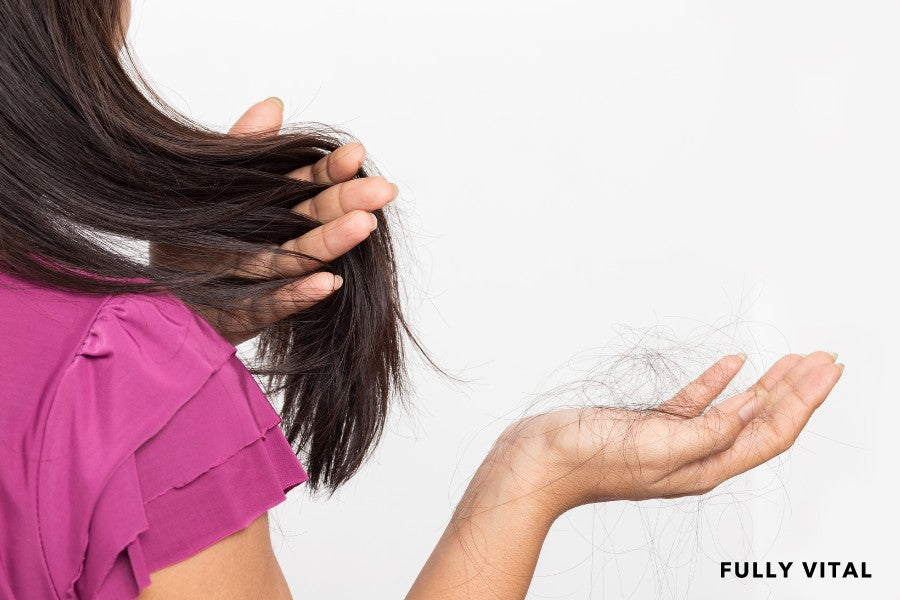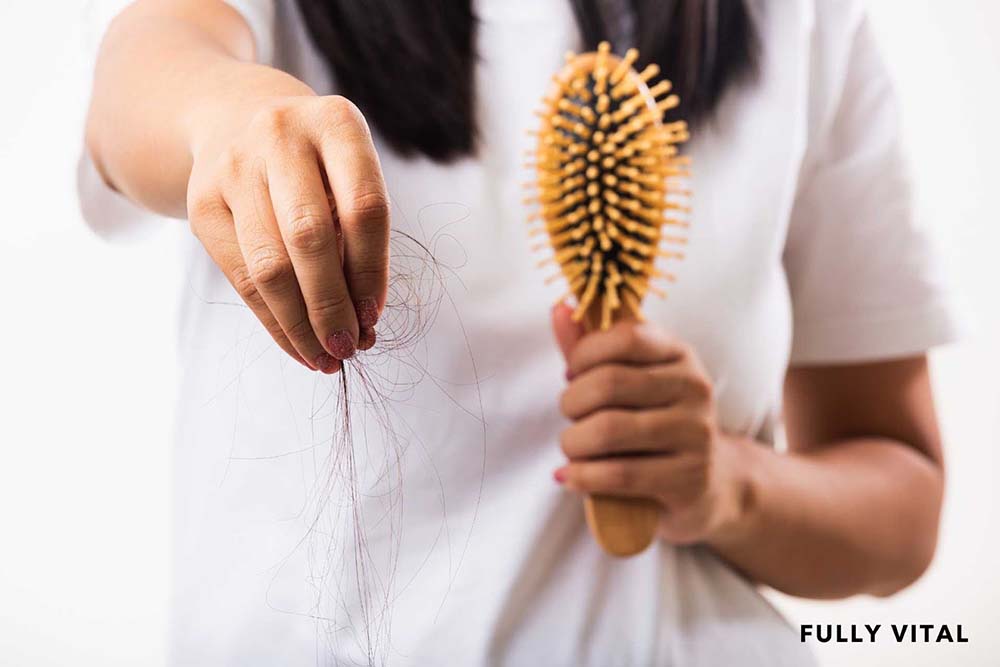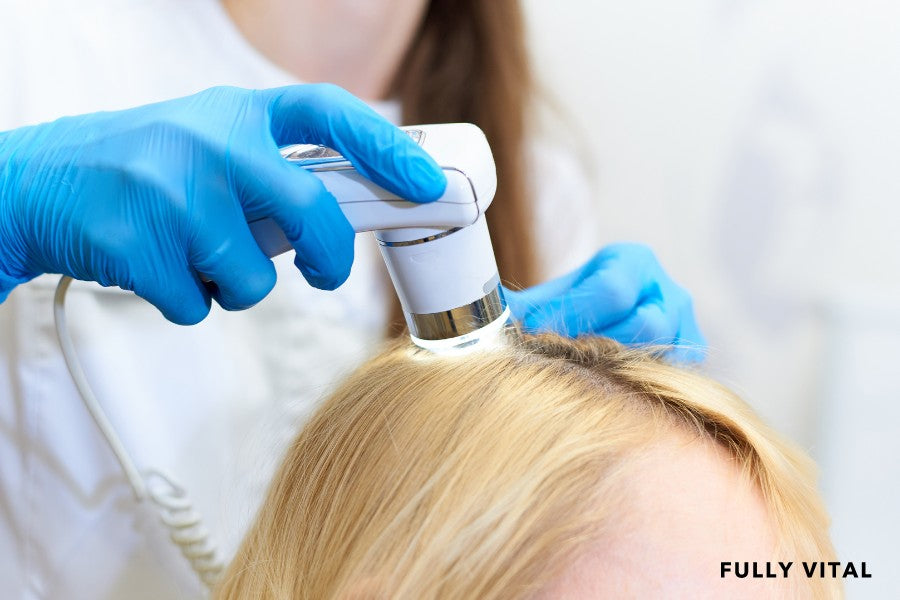
Can Hair Loss Be Reversed: Exploring Solutions For Women
In today's world, where appearance plays a significant role in self-confidence, hair loss can be distressing, especially for women of all hair types.
The good news is that advancements in hair growth treatments that have opened doors to potential solutions.
This article aims to provide insights into the question, "Can hair loss be reversed?" We'll delve into various aspects of hair loss, causes, emerging trends, lifestyle considerations, and maintenance to help you navigate this journey towards regaining luscious locks.

I LOVE MY HAIR NOW
FullyVital hair serum and hair vitamins made tremendous improvements in my hair. I truly love my hair now.
Dorit S.,
Is Hair Loss Permanent?
The question that often haunts those experiencing hair loss is whether it's permanent.
The answer isn't always straightforward.
Hair loss can be temporary or permanent, depending on the underlying cause.
Some cases of hair loss are reversible, while others might require ongoing management.1
Understanding the type of hair loss you're dealing with is essential in determining the potential for reversal.
Types Of Hair Loss
Hair loss isn't a one-size-fits-all scenario.
There are various types of hair loss that women might experience:
Androgenetic Alopecia
Also known as female pattern baldness, a hereditary condition that leads to gradual hair thinning.2
Telogen Effluvium
Triggered by physical or emotional stress, this condition causes hair to enter the resting phase prematurely, resulting in shedding.
Alopecia Areata
An autoimmune disorder causing sudden hair loss in round patches on the scalp.
Traction Alopecia
Caused by tight hairstyles that pull on the hair, resulting in damage and loss.
Anagen Effluvium
Often caused by chemotherapy, this type of hair loss impacts the growth phase of hair follicles.
Causes And Contributing Factors
Understanding the root causes of hair loss is crucial for effective reversal.
Several factors contribute to hair loss in women:
Hormonal Imbalances
Hormones play a significant role in regulating various bodily functions, including hair growth.
Fluctuations in hormone levels can disrupt the natural hair growth cycle, leading to hair loss.
Some common hormonal factors include:
-
Androgens: Dihydrotestosterone (DHT), a derivative of testosterone, is linked to male and female pattern baldness.
-
Thyroid Hormones: An overactive or underactive thyroid gland can influence hair growth.
Genetics And Hereditary Factors
Family history plays a crucial role in determining your susceptibility to hair loss.
If your parents or grandparents experienced hair loss, you might be genetically predisposed to it.
This is particularly relevant in conditions like androgenetic alopecia, commonly known as male and female pattern baldness.
Medical Conditions And Illnesses
Certain medical conditions and illnesses can trigger hair loss, including:
-
Alopecia Areata: An autoimmune disease that causes hair follicles to be attacked by the immune system.
-
Scalp Infections: Fungal infections like ringworm can lead to temporary or permanent hair loss.
-
Chronic Diseases: Conditions like diabetes and lupus can contribute to hair loss.
Poor Nutrition And Diet
A balanced diet rich in essential nutrients is vital for healthy hair growth.
Nutritional deficiencies can weaken hair follicles and lead to shedding.
Key nutrients for hair health include:
-
Protein: Hair is primarily composed of protein, making adequate intake crucial for growth.
-
Iron: Iron deficiency (anemia) can lead to hair thinning and loss.
-
Vitamins and Minerals: Biotin, vitamin D, zinc, and omega-3 fatty acids support hair growth.

Emerging Trends In Hair Loss Reversal
In recent years, advancements in hair loss treatments have offered promising solutions for women:
Topical Treatments
Minoxidil, an FDA-approved topical solution, is known to promote hair regrowth.3
Low-Level Laser Therapy (LLLT)
LLLT devices stimulate hair follicles and improve hair density.
Platelet-Rich Plasma (PRP)
PRP therapy involves using a patient's own blood to stimulate hair follicles.
Nutraceuticals
Supplements containing vitamins, minerals, and antioxidants can support hair health.
Hair Transplantation
Follicular unit transplantation (FUT) and follicular unit extraction (FUE) are surgical options for permanent hair restoration.
Lifestyle Considerations And Maintenance
Achieving and maintaining healthy hair involves more than just using products. Lifestyle factors play a significant role:
Balanced Diet
Nutrient-rich foods like fruits, vegetables, lean proteins, and healthy fats contribute to hair health.
Stress Management
Practicing relaxation techniques like meditation and yoga can reduce stress-related hair loss.
Gentle Hair Care
Avoid aggressive brushing, tight hairstyles, and excessive heat to prevent damage.
Regular Exercise
Physical activity improves blood circulation, supporting hair follicle health.
Adequate Sleep
Quality sleep allows the body to repair and regenerate, benefiting hair growth.

What Is Hair Loss?
Hair loss, scientifically known as alopecia, refers to the gradual or sudden loss of hair from the scalp or other parts of the body.
It can result from a variety of factors, including genetics, hormonal changes, medical conditions, and lifestyle choices.
Why Is Preventing Hair Loss Important?
Preventing hair loss is important for self-esteem, appearance perception, and overall well-being.
Hair loss can lead to insecurity, impact professional image, and disrupt cultural identity.
It serves as a natural barrier and its loss might signal underlying health issues.
Taking steps to address it can empower individuals and enhance satisfaction with their appearance.
Signs Of Hair Loss
Recognizing the signs of hair loss is crucial for early intervention.
Look out for:
-
Increased Hair Shedding: More hair than usual in your brush, on your pillow, or in the shower drain.
-
Thinning Hair: Noticeable reduction in hair volume and density.
-
Receding Hairline: Gradual hairline recession, often seen in male and female pattern baldness.
-
Bald Patches: Circular or irregular bald spots on the scalp.
Benefits Of Hair Loss Treatment
Advancements in hair loss treatments offer a range of benefits for those seeking to restore their hair's vitality:
Enhanced Confidence
Successful hair loss treatment can boost self-esteem and improve your overall outlook.
Regained Appearance
Restored hair growth can help you look and feel younger.
Reduced Stress
Addressing hair loss can alleviate the stress and anxiety associated with it.
Improved Hair Health
Treatments often promote healthier hair by nourishing the follicles and scalp.
What Are the Alternative Treatments For Hair Loss?
While traditional treatments like medications and hair transplants are effective, alternative approaches also show promise:
Microneedling
Tiny needles create micro-injuries in the scalp, stimulating hair follicles.
Aromatherapy
Essential oils like rosemary and peppermint may promote hair growth when massaged into the scalp.
Acupuncture
Traditional Chinese medicine suggests acupuncture can improve blood flow to the scalp and stimulate hair follicles.
Dietary Supplements
Biotin, zinc, and marine collagen are among the supplements believed to support hair health.
History Of Hair Loss Reversal
-
Ancient Remedies: Throughout history, various cultures have experimented with natural remedies and herbal concoctions to address hair loss.
-
Early Medical Interventions: In the 20th century, medical treatments like minoxidil and finasteride marked the beginning of clinically proven approaches.
-
Surgical Innovations: Hair transplantation techniques like FUT and FUE revolutionized the field, offering permanent solutions.
-
Advancements in Technology: Laser therapies, PRP, and stem cell research have introduced non-invasive alternatives with promising results.
Current Landscape Of Hair Loss Reversal
-
Scientific Research: Ongoing studies continue to uncover the molecular and genetic underpinnings of hair loss, guiding the development of targeted treatments.
-
Personalized Approaches: Tailored solutions based on individuals' genetic profiles and specific causes of hair loss are gaining traction.
-
Multidisciplinary Collaboration: Medical professionals, dermatologists, geneticists, and technologists collaborate to create comprehensive strategies.
-
Holistic Care: Recognizing the interplay of diet, stress, and lifestyle, holistic approaches are becoming central to hair loss management.
The Future Of Hair Loss Reversal
-
Genetic Insights: Genetic therapies could offer personalized treatments, targeting the root causes of hair loss at a molecular level.
-
Stem Cell Breakthroughs: Advances in stem cell research might lead to regenerative treatments that stimulate dormant hair follicles.
-
Nanotechnology: Innovative nanoscale interventions could facilitate drug delivery directly to hair follicles, enhancing treatment effectiveness.
-
Artificial Intelligence: AI-driven solutions might predict and prevent hair loss by analyzing genetic and lifestyle data.
-
Ethical Considerations: As science progresses, ethical discussions surrounding cloning and genetic modifications for hair growth will emerge.
Experience The Power Of FullyVital's Hair Growth ProductsUnlock the secret to maintaining luscious locks and nurturing a healthier relationship with your hair. At FullyVital, we're dedicated to bringing you science-backed solutions that can slow down and even reverse the aging of your hair. Our range of hair growth products is designed to:
Join us on this transformative hair care journey, and discover the potential of FullyVital's products to reignite your hair's natural vibrance. Elevate your hair care routine and uncover the beauty that comes with healthy, radiant hair. |
Final Thoughts On Can Hair Loss Be Reversed
In the quest to answer the age-old question, "Can hair loss be reversed?" we've journeyed through the intricate world of hair health.
From understanding the various types of hair loss to exploring treatments that span from ancient remedies to cutting-edge technologies, we've uncovered a tapestry of insights that empower you to make informed decisions.
Your hair is more than just strands; it's a reflection of your inner vitality and confidence.
Recognizing the significance of preventing hair loss and the transformative potential of effective treatments is a crucial step toward nurturing a healthy relationship with your locks.
At FullyVital, we're passionate about helping you embrace your hair's journey and revitalize its natural vibrance.
Our range of hair growth products is designed to halt the aging process, promoting fuller, more radiant hair.
With a commitment to innovation, research, and holistic care, we're dedicated to being your trusted partner on this hair restoration journey.
Frequently Asked Questions About Can Hair Loss Be Reversed
Can supplements alone cure hair loss?
Supplements can support hair health, but they are most effective when combined with a holistic approach that includes a balanced diet and proper hair care.
Are all types of hair loss reversible?
Not all types of hair loss are reversible.
The potential for reversal depends on the underlying cause and the extent of damage to the hair follicles.
How long does it take to see results from hair growth treatments?
Results vary among individuals and treatments. Some people might start noticing changes within a few months, while others might take longer.
Are hair transplantations suitable for women?
Yes, hair transplantations are a viable option for women experiencing certain types of hair loss, but a consultation with a specialist is essential to determine suitability.
Are over-the-counter hair growth products effective?
Some over-the-counter products, like minoxidil, have shown effectiveness in promoting hair regrowth. However, individual responses may vary.
Is PRP therapy painful?
PRP therapy is generally well-tolerated.
Discomfort during the procedure is minimal, and any soreness afterward is usually mild and temporary.
How often should I wash my hair to prevent hair loss?
Frequent hair washing can strip the scalp of natural oils, potentially causing dryness.
Aim to wash your hair every 2-3 days or as needed.
When should I seek professional help for my hair loss?
If you're concerned about hair loss, it's advisable to consult a dermatologist or a hair specialist to determine the underlying cause and explore suitable treatment options.
Are there age limitations for hair loss reversal treatments?
Hair loss reversal treatments can be effective for women of various ages, but the suitability of specific treatments might vary based on factors like overall health and the extent of hair loss.
Will wearing wigs or extensions worsen my hair loss?
Wearing wigs or extensions that are properly fitted and not too tight should not worsen hair loss.
However, it's important to choose options that allow your scalp to breathe and don't put undue stress on existing hair.
Sources:
-
Moore, K. (2012, July 20). Everything You Need to Know About Hair Loss. Healthline; Healthline Media. https://www.healthline.com/health/hair-loss
-
Ho, C. H., & Zito, P. M. (2019, May 18). Androgenetic Alopecia. Nih.gov; StatPearls Publishing. https://www.ncbi.nlm.nih.gov/books/NBK430924/
-
Suchonwanit, P., Thammarucha, S., & Leerunyakul, K. (2019). Minoxidil and its use in hair disorders: a review. Drug Design, Development and Therapy, Volume 13, 2777–2786. https://doi.org/10.2147/dddt.s214907







